Palmer L.R. The Greek Language
Подождите немного. Документ загружается.

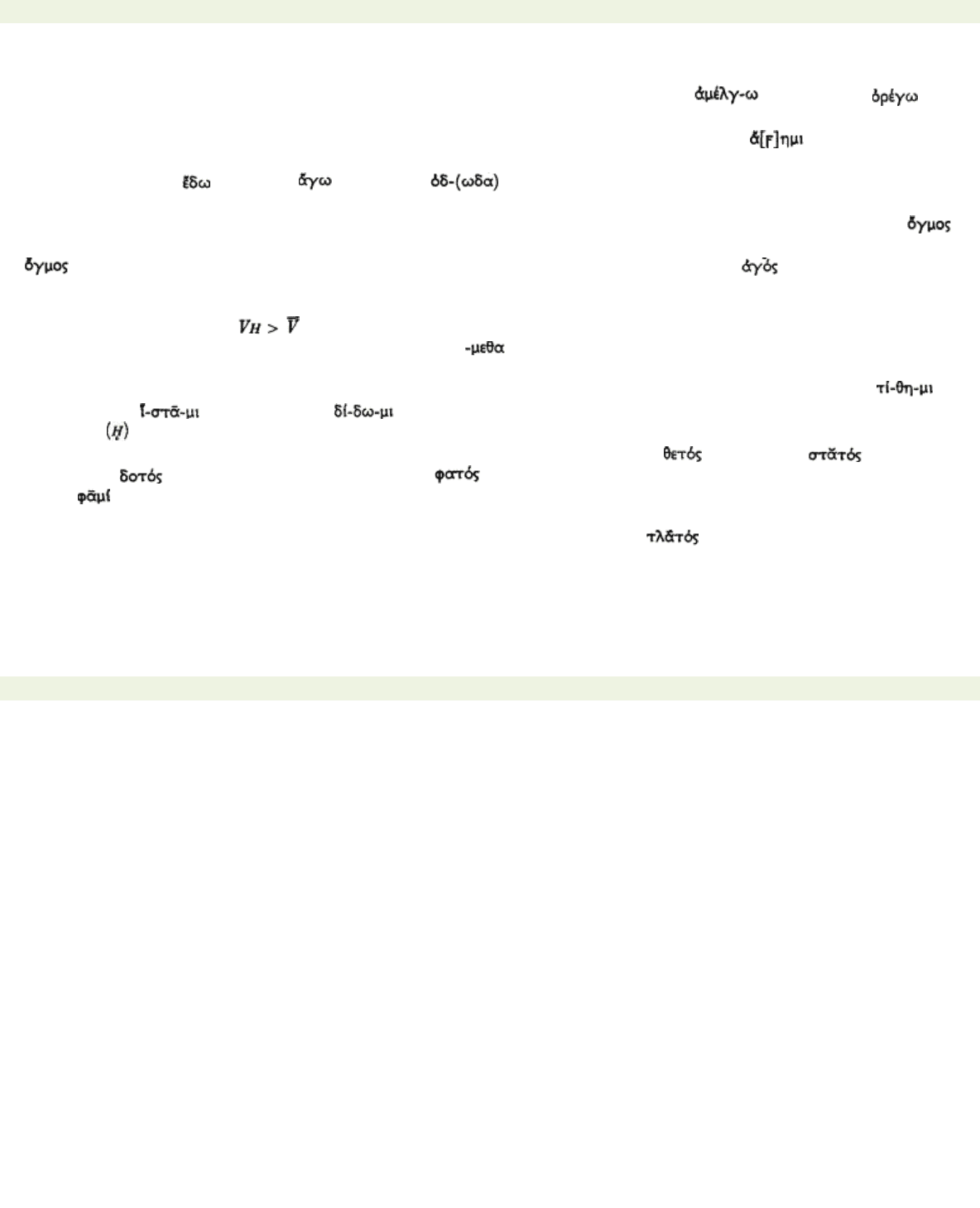
< previous page page_219 next page >
Page 219
'prothetic' vowels, the timbre of which betrays the nature of the lost laryngeal: e.g. < *H2melg-, <
*H3reg-.. In a significant number of instances there are parallel examples in Armenian (p. 221). Hittite provides
evidence for the laryngeal, for instance, in the word for 'wind' h(u)want-, Lat. ventus, Gk.
. (b) A laryngeal
affects a following vowel with its inherent timbre before disappearing: *H1e- > *e-, *H2e- > *a- and *H3e- >
*o-. Examples are:
< H1ed-,, < *H2eg-,, < *H3ed-. It was this disappearance of the initial
consonants that produced the apparent exceptions to the general rule that IE roots were normally of the pattern
CVC, e.g. *pet- (see below, p. 220). There is some dispute about the action of H2 on a following o: the noun
, for which we would expect an o-grade, suggests that the original form was H2ogós. Other scholars would adduce
and conclude that firs had no 'umlaut' effect on a following o. They would explain as the result of
analogy.
In the word-final position
(see on the a-stems on pp. 269 ff.). After a consonant the laryngeal was
vocalized (see P. 299 on the first plural middle ending
). Internally the laryngeals disappeared between
vowels. In sequences of the pattern VHC (where H stands for any laryngeal) the vowel was lengthened and took on
the characteristic timbre (either e or a or o) of the laryngeal involve: examples have already been quoted:
<
*di-deH3-mi.
< *si-steH2-mi, < * di-deH3-mi. Interconsonantally (CHC), the laryngeal is
vocalized and the vowel that appears in Greek reflects the inherent timbre of the laryngeal concerned. This is
the explanation of the apparent lack of parallelism between Greek and Latin in
(Lat. fa-c-), (Lat.
status) and
(Lat. datus). Another example is < *bhH2tós, with the zero grade of *bheH-'speak' which
yields
. More complex is the treatment of interconsonantal sonant+laryngeal (CSHC):1 there are two
reflections, which may be exemplified by the extended root *telH2- 'lift', 'bear', the zero grade of which would
have been *tlH2-. The participle with the expected form *tlH2tós appears as
, and this suggests that a 'prop-
vowel' developed between sonant and laryngeal, *tlºH2to-. This vowel derived its timbre
1 Note the use of S' for 'sonant'. Some authors prefer R (= 'resonant') and would write CRHC = consonant +
resonant + laryngeal + consonant.
< previous page page_219 next page >
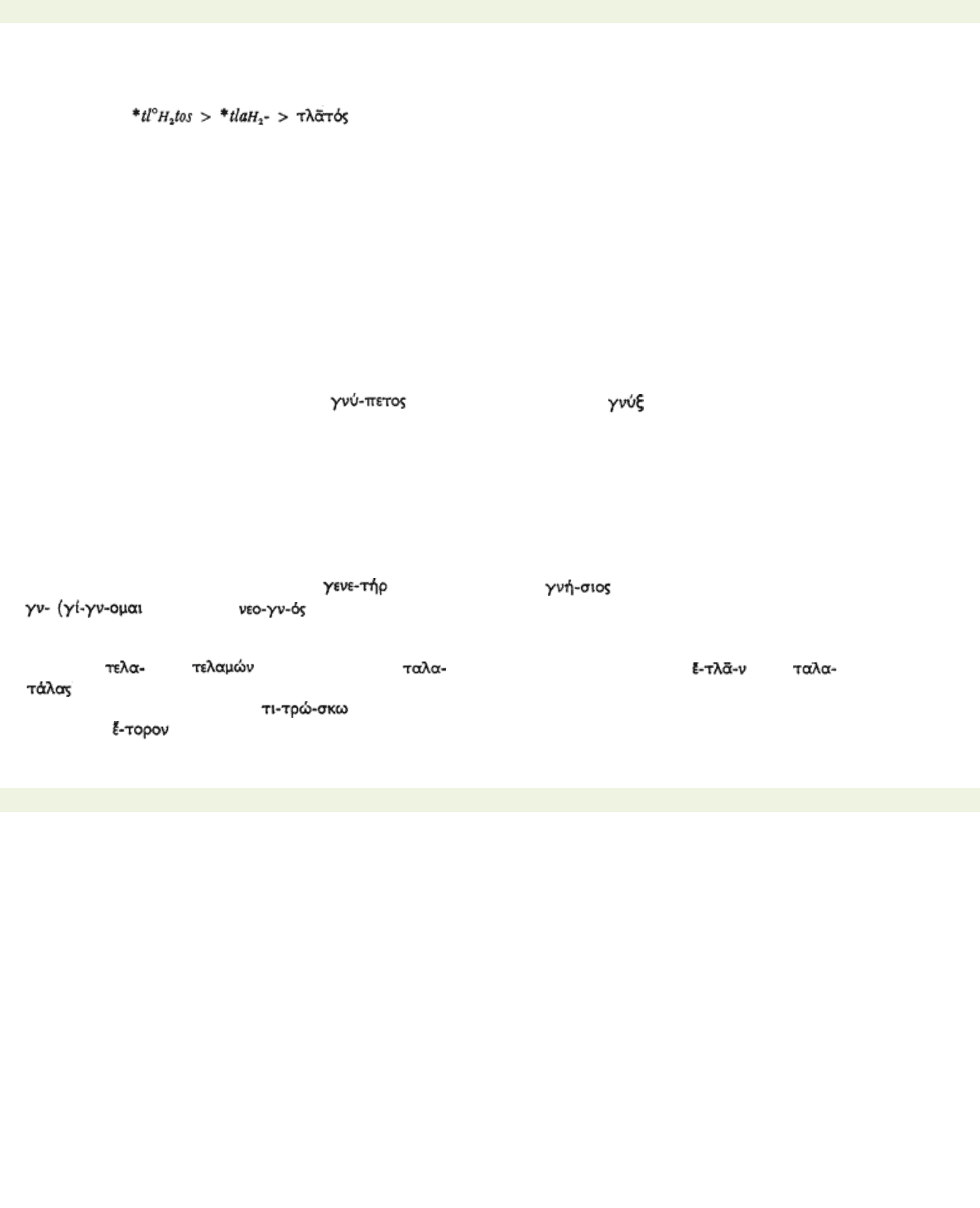
< previous page page_220 next page >
Page 220
from the particular laryngeal involved and subsequently underwent compensatory lengthening when the laryngeal
disappeared:
.
The last example brings out the fact that the Ablaut is a morphophonemic phenomenon: it is concerned with the
function of phonemes in the morphological system of a language. At this point it will be convenient to anticipate
the next chapter and explain what is meant by a 'disyllabic base'. A root of the pattern CVC like *gen- 'knee' may
be extended by a suffix *-w. This disyllabic base, *gen + w, exhibits Ablaut such that if the root has the full grade,
the suffix is zero (*gen+w-, form I): if the root is zero, then the suffix may be full (*gn + ew-, form II); finally
both elements may be zero (*gn+w-, form III). This theoretical system
I
II III
*gen+ w- *gn + ew- *gn + w-
is reflected in Lat. genu, Hitt. genu (both I); Goth. kniu, OE cneo, E. knee (all from Gmc. *kne-w-am), IE *gn-ew-
om (an extended form of II); and Gk.
'falling on the knee' and 'kneeling' (both from *gn + w-, form
III). The Ablaut relations are obscured if either the root or the suffix of the base contained a laryngeal. Thus the
root *gen- 'beget' with ablaut grades *gen-/gon-/gn- may be extended by the suffix -H1. This base may assume the
three forms:
I
II III
*gen + H1- *gn + eH1- *gn + H1
From form I come Greek words like
; from II those like 'genuine', 'legitimate'; from III those with
'I become', 'newly born').
In such formations the rules relating to the representation of the laryngeals in Greek apply. Thus *telH2-will
appear as
(e.g. 'belt'); *tleH2- as (e.g. the athematic root aorist ) and as 'rata- (e.g.
). Finally, a base *terH3- is reflected in the following word-family. Form II *treH3- 'bore', 'pierce', where
*eH3 > o, appears clearly in
'wound'; on the other hand, the form III *trH3-accounts for the thematic
root aorist
'I bored' (for these aorists, see p. 300).
< previous page page_220 next page >
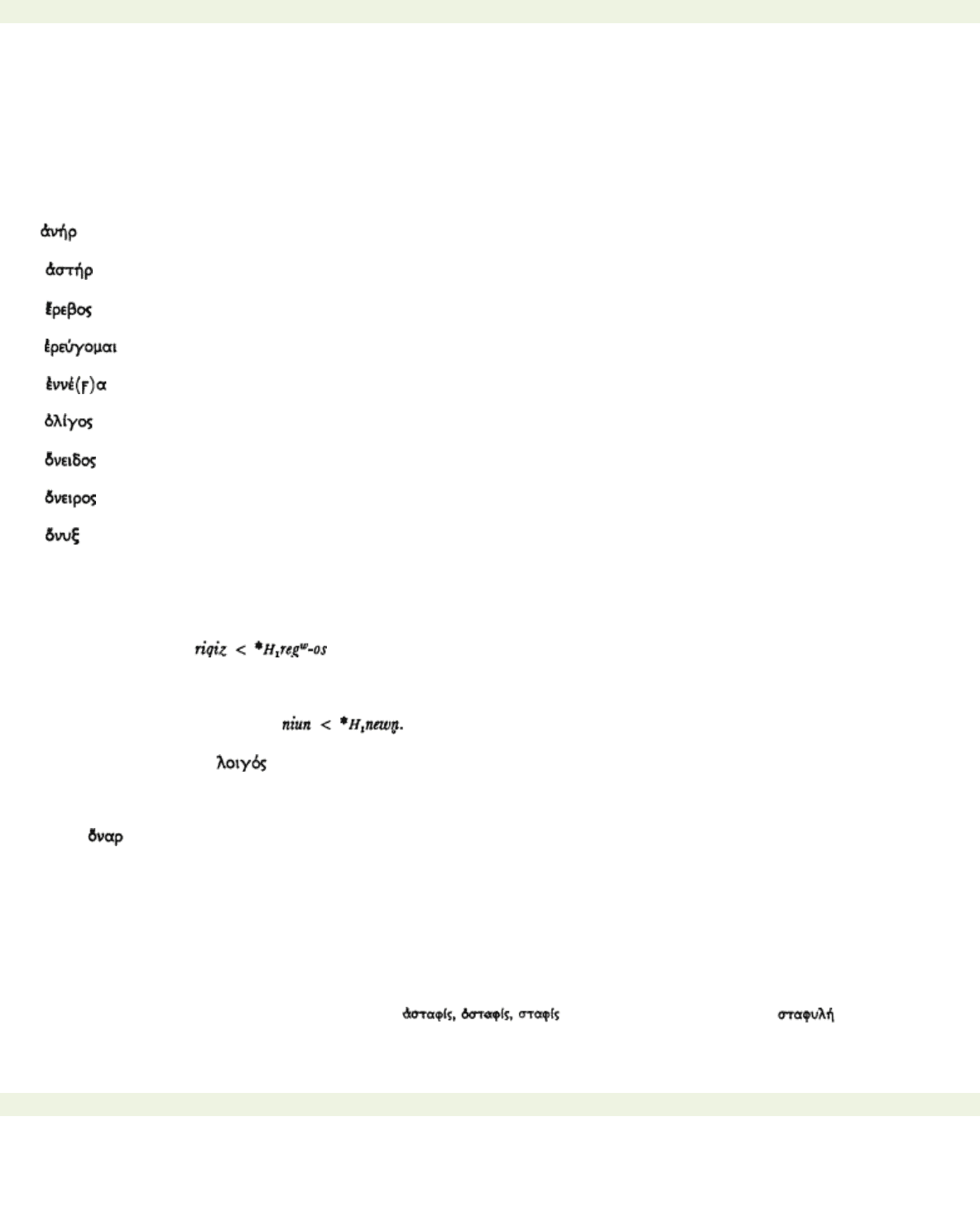
< previous page page_221 next page >
Page 221
Prothetic Vowels
In a number of words with clear IE etymological connections Greek presents an initial vowel absent from the other
languages, with the exception of Armenian (and more dubiously Albanian).1 An important basic observation is the
differing timbre of the prothetic vowel in Greek. We first list examples which have clear Armenian congeners. The
notes adduce other correspondences and indicate a 'laryngealist' reconstruction:
1
'man', ayr.
2. 'star', astl.
3. '(place of nether) darkness', erek ' evening'.
4. bellow', orcam.
5. 'nine', inn.
6. 'few', alk'at.
7. rebuke', anicanem.
8. 'dream', anurj.
9. 'nail', elungn.
1. Cf. Skt. nar-, Osc. ner- (cf. Lat. nero), Welsh ner < *H2ner-.
2. Goth. staírno, Skt. str-bhis (instr. pl.), Lat. stella < *H2ster-.
3' Skt. rá.jas-, Goth.
4. Lat. rugire < *H1reug-.
5. Lat. novem, Skt. náva, Goth.
6. The connection with 'ruin', 'havoc' and with Baltic, Albanian, and Irish is dubious.
7. Skt. nid-, Lett. nidu, Goth. ga-naitjan < *H3neid-.
8. Also , nom./acc. (also as adverb 'in a dream') < H3ner-/H3nr.
9. The l of Armenian is due to the dissimilation of n-n; the other languages have either *ongh-, *ngh * (e.g. Lat.
unguis) or nogh- (OHG nagal, OE. nagel).
The prothetic vowel is regular before IE words beginning with r- (see below), and most of the other examples
occur
1 To be distinguished from these are the prothetic vowels which occur in words which may plausibly be
assigned to the pre-Greek substratum: e.g.
'dried grapes', 'raisins', cf. 'bunch of
grapes'.
< previous page page_221 next page >
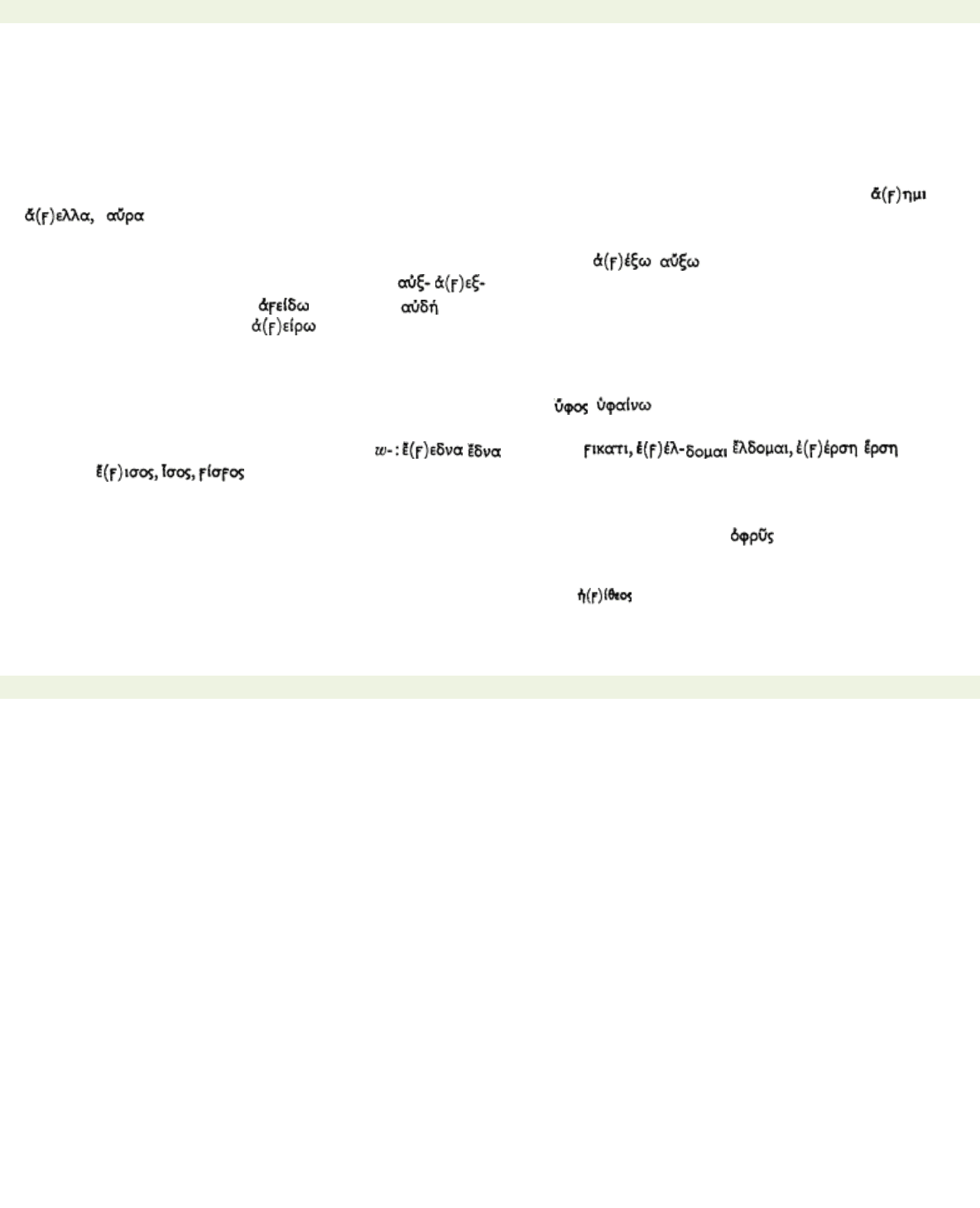
< previous page page_222 next page >
Page 222
before the sonants l, m, n, and w. The correspondences with Armenian and the varying timbre of the Greek
correspondences, however, make a strong prima fade case for the view that Greek and Armenian in their prothetic
vowels reflect preconsonantal sounds in initial position, and the laryngeal explanation in these instances commands
considerable support.
The prothesis before *w deserves separate treatment. In the root 'to blow' the word family represented by
,
implies a base (see p. 220) I H2ew-H1-II H2w-eH1-. From I come the words showing awe-, from
II those with (a)we- (Skt. vati *). The laryngeal appears in Hittite huwant* 'wind', the participle of *hwa-*
Morphologically parallel is the family derived from the root 'increase':
/ armco (Lat. augeo, Goth.
aukan) < I H2ew-g-/II H2w-eg- (from which / are derived by the addition of the formative -s-). More
difficult is the connection of
'sing' with which is universally admitted. The verb implies a base H2w-
ei-d-, the noun < *H2w-d-.
could likewise reflect *H2w-er 'lift', 'raise' with a corresponding I form
*H2ew-r-, but there are no obvious etymological connections.
A newly-emerged example (see p. 50 on Myc. ewepesesomena) supplies the e-grade of the root *webh- 'weave'
(OE wefan, OHG weban) corresponding to the zero grade *ubh- (
, , etc). There is nothing to support a
laryngeal explanation for the prothesis in the future participle ewepsesomena*, and prothetics appear sporadically
in a number of other words beginning with
/ , (Homer)/ / / (Skt.
varsá-),
,1 The conclusion must be that there is no simple explanation of the prothetic vowels in
Greek. It is legitimate to conduct morpho-phonemac explorations by means of the known relations of the Ablaut
forms and the laryngeal hypothesis, but in the absence of confirmatory observations (such as the Hittite huwant*)
the majority of the laryngeal 'solutions' remain purely algebraic. The prothetic vowel in
is not 'explained' by
positing *H3bhru-.
1 This may be derived from the root weidh-/widh-, detectable in Lat. vidua, di-vid-o, the basic
notion being 'cut', 'separate'.
< previous page page_222 next page >
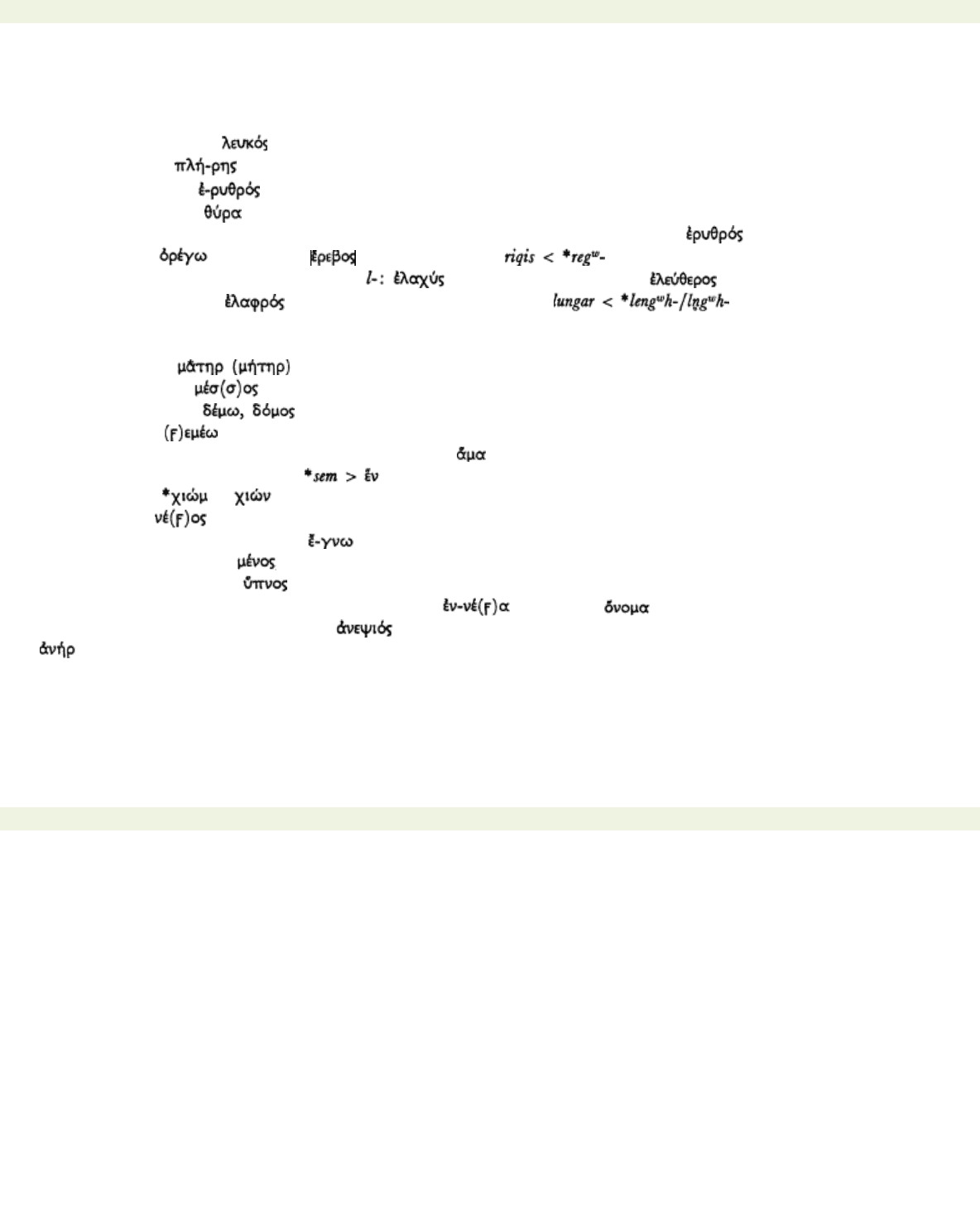
< previous page page_223 next page >
Page 223
4. Sonants As Consonants
l
*leuk- 'bright', 'white':
, Lat. lux, Skt. rocá- 'radiant'.
*ple-' fill', 'full': , Lat. plenus, Skt. pratá, Goth. furls.
r
*reudh-/rudh 'red':
, Lat. ruber, Skt. rudhirás, Goth. rauda-.
*dhwer-/dhur 'door' , Lat. fores, Skt. dvar *, Goth. daúr.
The majority of IE words with initial r- develop a 'prothetic vowel' in Greek: to
may be added (Lat. rego), (Skt. rájas, Goth. ), etc. Similar
vowels appear more sporadically before (< *legwh*, see above),
(Lat. liber < *leudh-), (Skt. raghú- 'swift', 'light', OHG ).
Such vowel prothesis occurs in Armenian, Greek and Luwian, but there is little
parallelism. For a discussion see above on laryngeals (p. 221).
m*mater 'mother':
, Lat. mater, Skt. matár-, OE modor.
*medhjos 'middle':
, Lat. medius, Skt. mádhya-, Goth. midjis.
*dem-/dom- 'build':
, Lat. domus, Skt. dáma-, Goth. tim-rjan 'build'.
*wem- 'vomit':
, Lat. vomo, Skt. vámiti, Lith. vemiù.
In word-final position -m > -n: e.g. *sem- 'one' (cf.
, Lat. sem-el, semper, Skt.
samá- 'same') in the neuter form
(for the other forms of this numeral, see p.
289); similarly > .
n
*newos 'new':
, Lat. novus, Skt. návas.
gno- < *gneH3- (p. 229) 'know':
.
*menos 'spiritual force': , Skt mánas-.
*swepno-/supno- 'sleep': , Lat. somnus, Skt. svápnas.
Some words show a prothetic vowel (see p. 221): < *newn*, (Lat.
nomen, Skt. naman-*, Goth. namo),
'cousin', Skt. nápat 'nephew', Lat. nepot-),
(Skt. nar-, Umbrian ner-).
j By the alphabetic period this IE phoneme1 had been
1 This is a voiced dorso-palatal fricative; it is often pronounced without friction as in the initial sound of
English yoke. Other notations used by Indo-Europeanists are *y and *j.
< previous page page_223 next page >
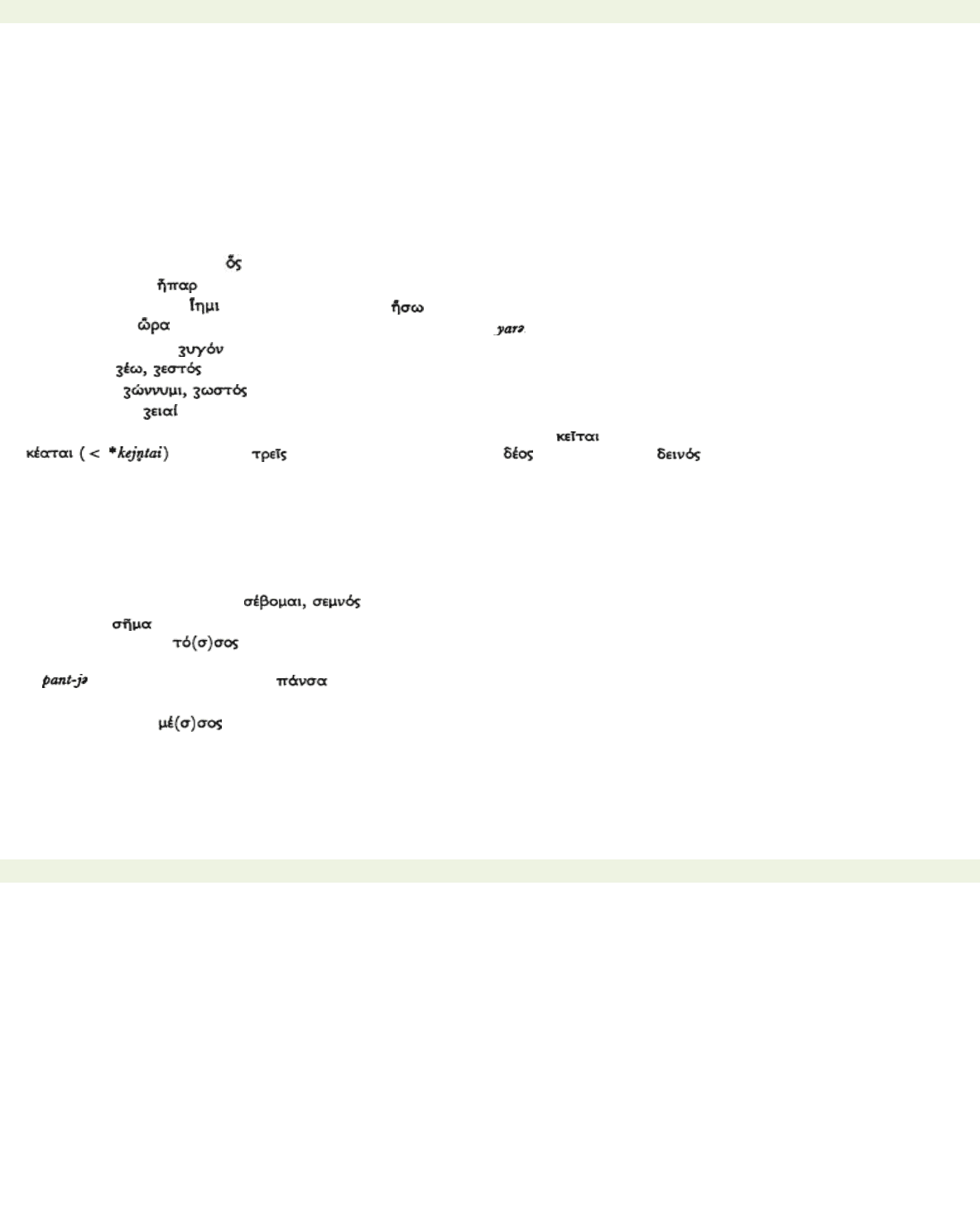
< previous page page_224 next page >
Page 224
completely eliminated. For its sporadic appearance in Mycenaean, see pp. 42f. In the
word-initial, antevocalic position Greek presents two sets of equivalents, (a) the aspirate
h, (b) z (for the pronunciation, see pp. 210f., 224). There is no satisfactory explanation for
this split, but the sound-law principle would compel the postulation of two different
phonemes or different conditioning of one and the same phoneme. The possibility that an
original *j- became aspirated under certain conditions, at present undefinable, is
strengthened by a parallel split in the treatment of initial *w- (see below). For the
representation in Mycenaean, see p. 44.
(a) *jos 'who' (relative):
, Skt. yás.
*jeqwr * 'liver':
, Lat. iecur, Skt. yakrt, Lith. (j)eknos*.
*je- 'let go', 'throw':
(< *ji-je-mi), future , Lat. iacio, ieci.
*jor-'season':
, Lat. hornus (< *ho-jor-(i)nos), Avest.
(b) *jugom 'yoke': , Lat. iugum, Skt. yugám, Goth. juk.
*jes-'boil':
Skt. yásati, OHG jesan.
*jos- 'gird':
, Avest. yasta-, Lith. júostas.
*jewo- 'spelt':
, Skt. yáva-, Lith. javai*.
Intervocalically -j- had disappeared by the alphabetic period: e.g.
'he lies'/
'they lie'; < *trejes (cf. Skt. tráyas); < *dwejos (cf. ). The
date of the loss of -j- depends on the assessment of the Mycenaean spelling fluctuations
(see pp. 42 ff.).
In consonant clusters1 j effected a wide variety of changes comprised under the term
'yodization'.
*tj and *thj > s initially and > -ss- intervocalically (simplified in certain dialects, e.g.
Attic).
*tjegw-* 'respect', 'revere':
, Skt. tyájati.
*dhja- '?':
'sign', Skt. dhya-man 'thought'.
*totjo- 'so many':
(cf. Lat. tot < toti).
'all' (nom. sing. fern.): (for the development of this secondary -ns- see p.
236f.).
*medhjo- 'mid':
, Lat. medius, Skt. mádhya-.
1 Consonants are treated below, but it is convenient to discuss these dusters here. For the labio-velars, see
pp. 232 ff.
< previous page page_224 next page >
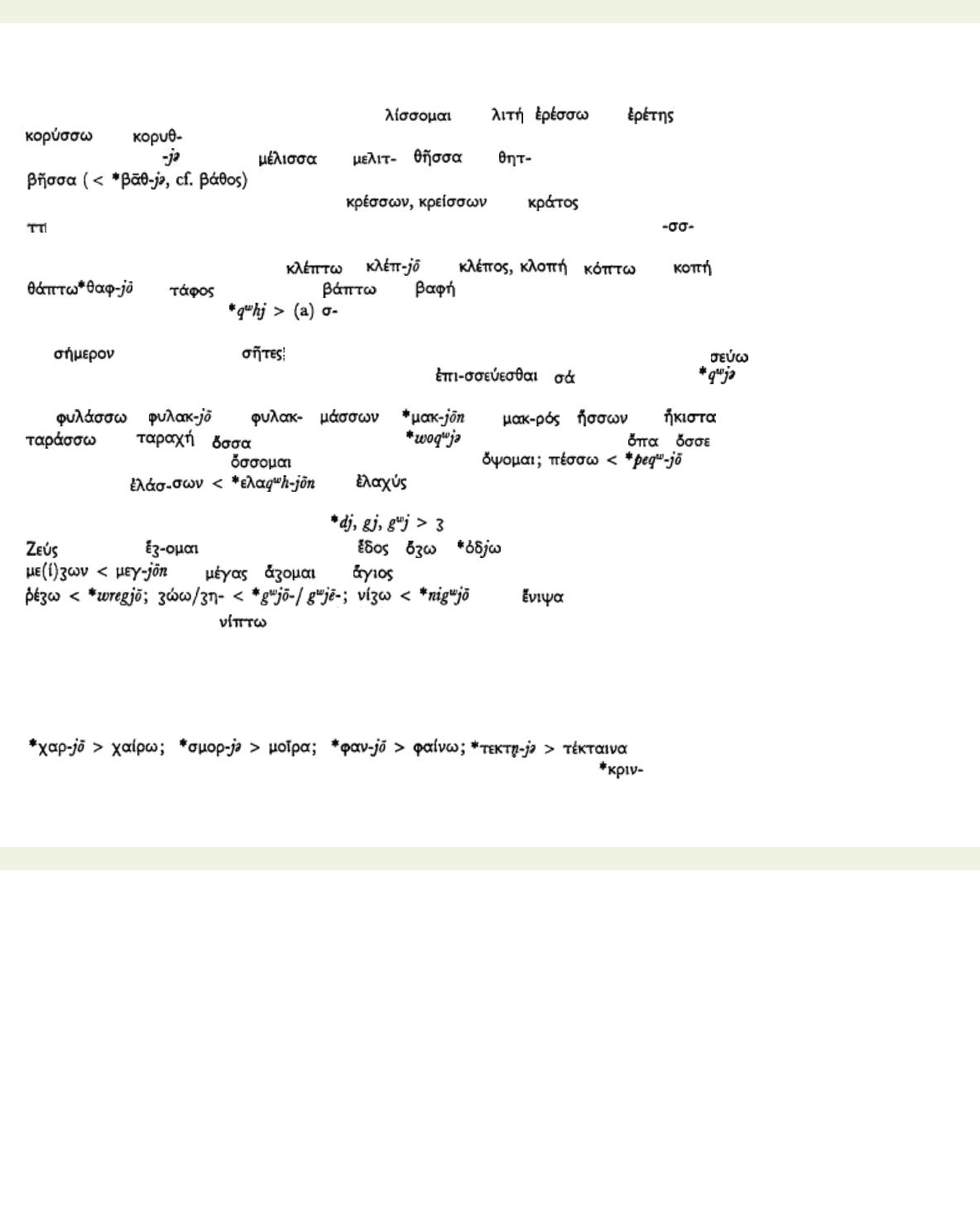
< previous page page_225 next page >
Page 225
In certain morphological categories we have -ss- which is not simplified.
(i) present stems (p. 265) in -t-jo and -q-jo:
(cf. ) (cf. ),
(cf. ).
(ii) feminines in
(p. 270): (cf. ), (cf. )
.
(iii) comparatives in -jos- (pp. 279 ff.);
(cf. , etc.). On the Attic
for ss in these categories see pp. 62 and 280. On the dialectal distribution of and
-s- see above.
*pj and * phj > at in all dialect:
< (cf. ), (cf. ),
(cf. , see p. 231), (cf. ).
*kj and *khj, *qwj * and (Attic t) initially and (b) ss (Attic tt)
intervocalically:
(a)
< *kj-ameron, < *kja-wetes 'this year' (on Myc. zawete, see p. 43);
< *kjew-, cf. Skt. cyávate (intervocalic ss in Horn. ): . (Megarian) <
(see p. 287).
(b)
< (cf. ); < (cf. ); (cf. );
(cf. ); 'voice', 'rumour' < (cf. Hom. acc. sing. );
'two eyes' < *oqwje*, cf. (pres. stem in -j-), fut. (cf.
Lat. coquo); (cf. ).
< *djeus: < *sed-jo-mai (cf. ); < (cf. Lat. odor);
(cf. ); (cf. );
(aor. , giving rise to a new
analogical present stem
).
The chronology of the changes in (3) and (4) depends on the interpretation of the Linear
B signs transcribed as za, ze, zo (see pp. 31 if.). In our view the changes are post-
Mycenaean Liquids and nasals +-j.
(a) In -rj- and -nj- the sonants are palatalized with the result that the preceding vowel
develops a front off-glide:
With vowels
other than a and o the front glide results in a lengthening of the vowel:
< previous page page_225 next page >
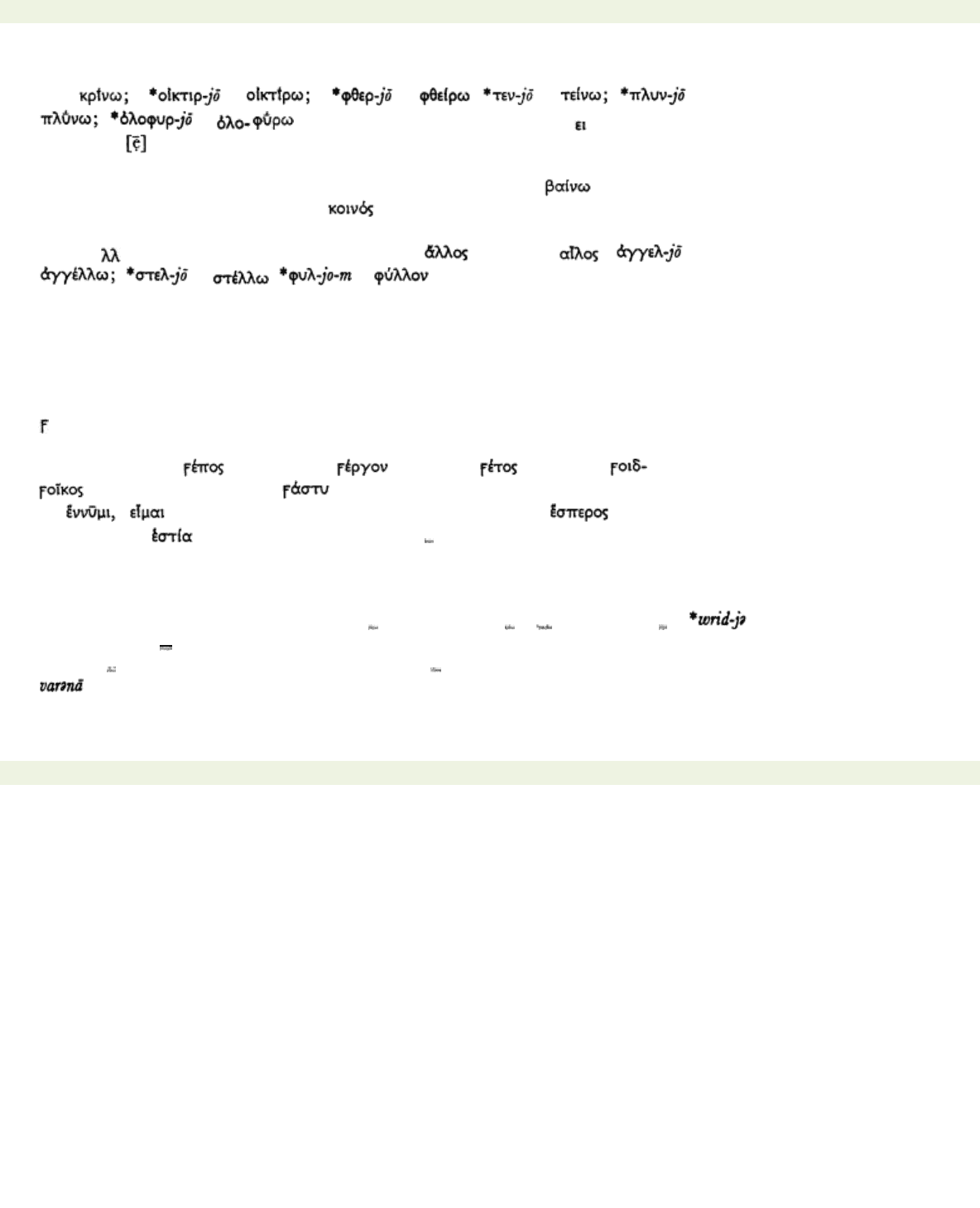
< previous page page_226 next page >
Page 226
jo > > > ; > >
> . Note that the Attic-Ionic spelling in these examples
represents . For the divergent dialect treatment of these clusters (consonant
gemination instead of vocalic assimilation), see p. 61).
(b) There are no certain examples to illustrate the cluster -mj-:
is not necessarily
< *gwm-jo * (see p. 241); nor does
< *komjos since Greek lacks the preposition
kom (Lat. cum).
(c) lj >
, a geminated palatal lateral' *aljos > (cf. Cypr. ); >
> , > .
For -uj-, -wj-, see below p. 227.
wThis sound was still preserved in all positions in the Linear B inscriptions, but had been
eliminated by the time of the earliest alphabetic inscriptions of Attic and Ionic (and East
Doric). Elsewhere it was more resistant and has been preserved initially down to the
present day in the Tsakonian dialect (see p. 190). For the digamma in Homer, see pp.
86f. Initially before a vowel there are three treatments, (a) with a prothetic vowel; (b) as
; (c) as an aspirate.
(a) See p. 222 and for Myc. ewepesesomena, see p. 50.
(b) *weqw-os* <
; *wergom > ; *wetos > ; *woid- > ; *woikos >
; *wastu (Skt. vastu*) > .
(c) < *wes- (Lat. vestis, Skt. váste, Goth. wasjan); < *wesper-os
(Lat. vesper);
< *west-ia (?) (Lat. Vesta); < *wek-/uk- (Hitt. wek-mi), Skt. vás-
mi, usánt-. The conditioning factor for this treatment of initial w- may lie in the
following s but no regular 'law' can be formulated.
The sole initial clusters beginning with w- are wr- and wl-. The dialect treatment is
similar to that of initial ante-vocalic *w:
< *wregjo (for < , see p. 238); <
(Myc. wiriza); < *werh1-/wreH1- (Lat. verbum, Hitt. werija-, Skt. vratá-, Goth.
waúrd);
< *wru- (for Myc. u-ru-to, see p. 39); 'wool' < *wlanos (Lat. lana, Avest.
, Lith. vìlna, Goth. wulla).
< previous page page_226 next page >

< previous page page_227 next page >
Page 227
In initial clusters where w comes second only dw- still survived in the alphabetic
period. In other clusters the w was eliminated:
(a) *dw-:
< *dejos (Skt. dvésti); for the perfect < *de-dwoi-m *, see p. 95).
(b) *dhw-:
'hinge.', cf. < *dhwor-jo-s*.
(c) *kw-:
< *kwa-/ku- 'have power, possession' (Skt. svá-tr-a- 'vigorous',
'strong'). The zero grade occurs in
.
(d) *ghw-:
(Aeol. ) < *ghwer- (Lith. zvérìs, O.Sl. zveri, Lat. ferus).
(e) *tw-: < *twe, *twoi (see p. 288); < *twakos (Skt. tvác- 'skin', Hitt.
twekkas 'body');
< *tweis- (Skt. tvésati).
Internally w is less stable and it rarely occurs even in dialects which exhibit it in
initial position. In Mycenaean, on the other hand, it survived in full vigour in all
positions, including clusters with other sonants, wj, wr, wl: gen. sing.
>
(see p. 277) < *naw-os (Lat. navis, Skt. navás); < *newos (Lat.
novus, Skt. návas, Goth. niujis);
< *klewos (Skt. sráas-, O.Sl. slovo 'word');
, < *stre-/srow- (Skt. srávati, srávas); < *aiw-
(Lat. aevom, Goth. aiws);
< *owis (Lat. ovis, Skt. ávis, Luw. hawi-*).
-wj-
< *kaw-jo, cf. (Lesb.) < *bhu-jo, cf. , Lat. fui, Skt. bbávati,
etc.); < *diw-jos; (Myc. meujo, mewijo) < *meiw-jon.
-
Vwl-
and - Vwr- > -ul- and -ur-:
< ; , Horn. aor. part.<
. Analogical action preserved -wr- in the paradigms: e.g. Argive ,
Attic
, cf. < .
There remain the clusters of consonants with w: -dm- is still preserved in
Mycenaean, where the participle of *weid- was
, later (Skt. vid-van*,
Goth. weit-wops). For the Homeric evidence, see p. 95; -tw- >
/ :
< *qwetwores*; -kw- > -pp-: (Myc. iqo) < *ekwo- (Lat.
equos, Skt. ásvas). The sonant clusters -nw-, -lw- and -rw- were preserved in certain
dialects until the alphabetic period. The divergent treatment in Attic and Ionic shows
that the loss of -w- was later than
< previous page page_227 next page >

< previous page page_228 next page >
Page 228
proto-Attic-Ionic and later than the fronting of a > h (see pp. 6e f.).
Attic Ionic Doric
* ksenwos
/
*kalwos
*solwos
*korwa
For -ws- and -sw- see below.
5. Consonants
The consonantal phonemes attributed to IE comprised a rich variety of stops (plosives) with a structure of 'manner'
and 'place' oppositions set forth in the following table. The only fricative was the sibilant s (with an allophone z).
On the postulated laryngeal phonemes, see pp. 218f.
Place Manner
Voiceless Voiced Vº Aspirate V Aspirate
Labial p b (ph) bh
Dental t d (th) dh
Palatal k g (kh) gh
Velar (q) (g) (qh) (gh)
Labio-velar1 qw * gw* (qwh*) gwh*
The status of the parenthesized items (velars and voiceless aspirates) is disputed. They need no discussion here
since both distinctions are irrelevant for Greek, where they have a single series of representations. Apart from the
devoicing of the voiced aspirates (see pp. 5, 40) all the IE plosives were preserved faithfully until proto-Greek.
There was, however, one striking phenomenon which may be taken as a constitutive feature of Greek: all plosives
in word-final position were lost:
< melit, < *galakt, < *tod, < *qwid*, etc. The labio-velars, on the
evidence of the Linear B tablets, still existed as distinct phonemes (except in the vicinity of a u-sound) until the
end of the Mycenaean period. During the Dark Ages
1 The labio-velars are velar plosives pronounced with simultaneous lip-rounding. They must be
distinguished from dusters k + w, etc. The distinction may be illustrated by the contrasting phrases free
quarters [ fri:
] and freak waters [frik ] (see Descriptive and Comparative Linguistics, 60-1).
< previous page page_228 next page >
